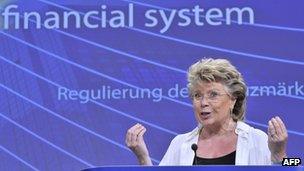Libor fixing to become criminal offence, EU proposes
- Published

EU justice commissioner Viviane Reding says the proposals will help restore public confidence
The European Commission has proposed making interest rate fixing a criminal offence in the wake of the Libor banking scandal.
Manipulating benchmark rates, such as Libor and Euribor, will be added to insider dealing as criminal offences, <link> <caption>the Commission said in a statement</caption> <altText>link to EC statement</altText> <url href="http://europa.eu/rapid/pressReleasesAction.do?reference=IP/12/846&format=HTML&aged=0&language=EN&guiLanguage=en" platform="highweb"/> </link> .
Justice commissioner Viviane Reding said the move would help "put an end to criminal activity in the banking sector".
It wants EU members to pass new laws.
"Public confidence has taken a nosedive with the latest scandals about serious manipulations of lending rates by banks," Ms Reding said.
"This is why we are today proposing EU-wide rules to tackle this type of market abuse and close any regulatory loopholes.
"A swift agreement on these proposals will help restore much needed confidence of the public and investors in this crucial sector of the economy."
'Major flaws'
The UK welcomed the Commission's announcement and said it would feed the results of its own rate fixing review into the debate.
Ms Reding went on to criticise the Bank of England for its lack of awareness of the Libor rate fixing scandal.
"Libor revealed major flaws in the governance of the process," she said.
Barclays Bank was fined £290m after admitting that it attempted to manipulate the Libor and Euribor rates between 2005 and 2009.
The scandal led to the resignations of chief executive Bob Diamond, chairman Marcus Agius, and chief operating officer, Jerry del Missier.
Fifteen financial institutions are still under investigation in the US, UK and Asia in connection with the rate-fixing scandal.
They are the Bank of Tokyo-Mitsubishi UFJ, Citigroup, Credit Suisse, Deutsche Bank, HSBC, ICAP, JP Morgan Chase, Lloyds Banking Group, Mizuho Financial Group, Rabobank, Royal Bank of Scotland, RP Martin Holdings, Societe Generale, Sumitomo Mitsui Banking and UBS.